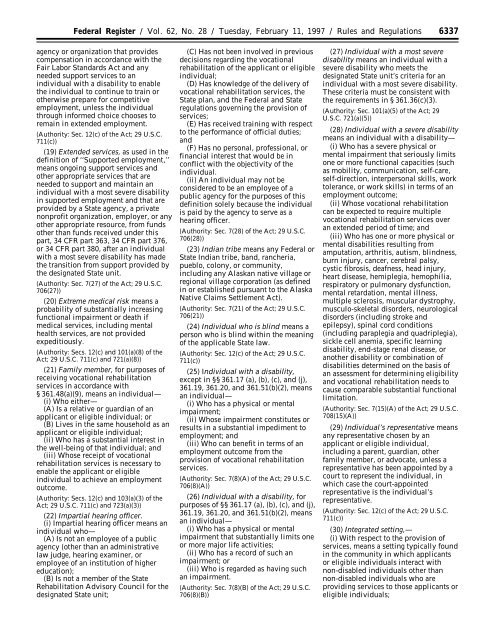federal register - U.S. Government Printing Office
federal register - U.S. Government Printing Office
federal register - U.S. Government Printing Office
You also want an ePaper? Increase the reach of your titles
YUMPU automatically turns print PDFs into web optimized ePapers that Google loves.
Federal Register / Vol. 62, No. 28 / Tuesday, February 11, 1997 / Rules and Regulations6337agency or organization that providescompensation in accordance with theFair Labor Standards Act and anyneeded support services to anindividual with a disability to enablethe individual to continue to train orotherwise prepare for competitiveemployment, unless the individualthrough informed choice chooses toremain in extended employment.(Authority: Sec. 12(c) of the Act; 29 U.S.C.711(c))(19) Extended services, as used in thedefinition of ‘‘Supported employment,’’means ongoing support services andother appropriate services that areneeded to support and maintain anindividual with a most severe disabilityin supported employment and that areprovided by a State agency, a privatenonprofit organization, employer, or anyother appropriate resource, from fundsother than funds received under thispart, 34 CFR part 363, 34 CFR part 376,or 34 CFR part 380, after an individualwith a most severe disability has madethe transition from support provided bythe designated State unit.(Authority: Sec. 7(27) of the Act; 29 U.S.C.706(27))(20) Extreme medical risk means aprobability of substantially increasingfunctional impairment or death ifmedical services, including mentalhealth services, are not providedexpeditiously.(Authority: Secs. 12(c) and 101(a)(8) of theAct; 29 U.S.C. 711(c) and 721(a)(8))(21) Family member, for purposes ofreceiving vocational rehabilitationservices in accordance with§ 361.48(a)(9), means an individual—(i) Who either—(A) Is a relative or guardian of anapplicant or eligible individual; or(B) Lives in the same household as anapplicant or eligible individual;(ii) Who has a substantial interest inthe well-being of that individual; and(iii) Whose receipt of vocationalrehabilitation services is necessary toenable the applicant or eligibleindividual to achieve an employmentoutcome.(Authority: Secs. 12(c) and 103(a)(3) of theAct; 29 U.S.C. 711(c) and 723(a)(3))(22) Impartial hearing officer.(i) Impartial hearing officer means anindividual who—(A) Is not an employee of a publicagency (other than an administrativelaw judge, hearing examiner, oremployee of an institution of highereducation);(B) Is not a member of the StateRehabilitation Advisory Council for thedesignated State unit;(C) Has not been involved in previousdecisions regarding the vocationalrehabilitation of the applicant or eligibleindividual;(D) Has knowledge of the delivery ofvocational rehabilitation services, theState plan, and the Federal and Stateregulations governing the provision ofservices;(E) Has received training with respectto the performance of official duties;and(F) Has no personal, professional, orfinancial interest that would be inconflict with the objectivity of theindividual.(ii) An individual may not beconsidered to be an employee of apublic agency for the purposes of thisdefinition solely because the individualis paid by the agency to serve as ahearing officer.(Authority: Sec. 7(28) of the Act; 29 U.S.C.706(28))(23) Indian tribe means any Federal orState Indian tribe, band, rancheria,pueblo, colony, or community,including any Alaskan native village orregional village corporation (as definedin or established pursuant to the AlaskaNative Claims Settlement Act).(Authority: Sec. 7(21) of the Act; 29 U.S.C.706(21))(24) Individual who is blind means aperson who is blind within the meaningof the applicable State law.(Authority: Sec. 12(c) of the Act; 29 U.S.C.711(c))(25) Individual with a disability,except in §§ 361.17 (a), (b), (c), and (j),361.19, 361.20, and 361.51(b)(2), meansan individual—(i) Who has a physical or mentalimpairment;(ii) Whose impairment constitutes orresults in a substantial impediment toemployment; and(iii) Who can benefit in terms of anemployment outcome from theprovision of vocational rehabilitationservices.(Authority: Sec. 7(8)(A) of the Act; 29 U.S.C.706(8)(A))(26) Individual with a disability, forpurposes of §§ 361.17 (a), (b), (c), and (j),361.19, 361.20, and 361.51(b)(2), meansan individual—(i) Who has a physical or mentalimpairment that substantially limits oneor more major life activities;(ii) Who has a record of such animpairment; or(iii) Who is regarded as having suchan impairment.(Authority: Sec. 7(8)(B) of the Act; 29 U.S.C.706(8)(B))(27) Individual with a most severedisability means an individual with asevere disability who meets thedesignated State unit’s criteria for anindividual with a most severe disability.These criteria must be consistent withthe requirements in § 361.36(c)(3).(Authority: Sec. 101(a)(5) of the Act; 29U.S.C. 721(a)(5))(28) Individual with a severe disabilitymeans an individual with a disability—(i) Who has a severe physical ormental impairment that seriously limitsone or more functional capacities (suchas mobility, communication, self-care,self-direction, interpersonal skills, worktolerance, or work skills) in terms of anemployment outcome;(ii) Whose vocational rehabilitationcan be expected to require multiplevocational rehabilitation services overan extended period of time; and(iii) Who has one or more physical ormental disabilities resulting fromamputation, arthritis, autism, blindness,burn injury, cancer, cerebral palsy,cystic fibrosis, deafness, head injury,heart disease, hemiplegia, hemophilia,respiratory or pulmonary dysfunction,mental retardation, mental illness,multiple sclerosis, muscular dystrophy,musculo-skeletal disorders, neurologicaldisorders (including stroke andepilepsy), spinal cord conditions(including paraplegia and quadriplegia),sickle cell anemia, specific learningdisability, end-stage renal disease, oranother disability or combination ofdisabilities determined on the basis ofan assessment for determining eligibilityand vocational rehabilitation needs tocause comparable substantial functionallimitation.(Authority: Sec. 7(15)(A) of the Act; 29 U.S.C.708(15)(A))(29) Individual’s representative meansany representative chosen by anapplicant or eligible individual,including a parent, guardian, otherfamily member, or advocate, unless arepresentative has been appointed by acourt to represent the individual, inwhich case the court-appointedrepresentative is the individual’srepresentative.(Authority: Sec. 12(c) of the Act; 29 U.S.C.711(c))(30) Integrated setting,—(i) With respect to the provision ofservices, means a setting typically foundin the community in which applicantsor eligible individuals interact withnon-disabled individuals other thannon-disabled individuals who areproviding services to those applicants oreligible individuals;


